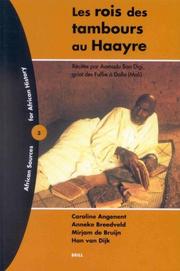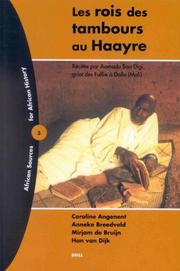| Listing 1 - 10 of 295 | << page >> |
Sort by
|

ISBN: 9789004492394 9789004124462 Year: 2003 Publisher: Leiden; Boston : BRILL
Abstract | Keywords | Export | Availability | Bookmark
 Loading...
Loading...Choose an application
- Reference Manager
- EndNote
- RefWorks (Direct export to RefWorks)
The text in this volume covers a large period. It runs from the intensification of Islamic teaching during the reign of Alu Maana, to the struggles and intrigues at the court when Seeku Aamadu reigned over the neighbouring Islamic emirate of Maasina, to the French colonial regime. During the latter episode, a lot of attention is given to the manipulation of the appointment of rulers and the subsequent decline of their power under Modibo Keita and Moussa Traoré in independent Mali. This interference of the French has resulted in doubts about the legitimacy of the kings, which is symbolized by the royal drums that are no longer played upon. The political developments involving the foundation of two parties by the Malian state, further diminished the role of the leaders of the Haayre as mediators for their people. This development is embodied in the final sentence of the text when Aamadu Baa Digi desperately concludes that "Jamaa oo, haya joonin, kaanankoo'be mon 'be, laamu walaa", which was translated as "Peuple, maintenant, vos rois, ils n'ont plus de pouvoir". A team of researchers from different disciplinary backgrounds (forestry, anthropology, linguistics, religious studies) has provided commentary on the social, cultural, geographic, ecological, political, linguistic and religious context of this text. An account is also given on the production and the producer of this text recited so vividly by Aamadu Baa Digi.

ISBN: 9004492399 9004124462 Year: 2003 Publisher: Leiden; Boston : BRILL,
Abstract | Keywords | Export | Availability | Bookmark
 Loading...
Loading...Choose an application
- Reference Manager
- EndNote
- RefWorks (Direct export to RefWorks)
The text in this volume covers a large period. It runs from the intensification of Islamic teaching during the reign of Alu Maana, to the struggles and intrigues at the court when Seeku Aamadu reigned over the neighbouring Islamic emirate of Maasina, to the French colonial regime. During the latter episode, a lot of attention is given to the manipulation of the appointment of rulers and the subsequent decline of their power under Modibo Keita and Moussa Traoré in independent Mali. This interference of the French has resulted in doubts about the legitimacy of the kings, which is symbolized by the royal drums that are no longer played upon. The political developments involving the foundation of two parties by the Malian state, further diminished the role of the leaders of the Haayre as mediators for their people. This development is embodied in the final sentence of the text when Aamadu Baa Digi desperately concludes that "Jamaa oo, haya joonin, kaanankoo'be mon 'be, laamu walaa", which was translated as "Peuple, maintenant, vos rois, ils n'ont plus de pouvoir". A team of researchers from different disciplinary backgrounds (forestry, anthropology, linguistics, religious studies) has provided commentary on the social, cultural, geographic, ecological, political, linguistic and religious context of this text. An account is also given on the production and the producer of this text recited so vividly by Aamadu Baa Digi.
Book
ISBN: 0870949764 Year: 1988 Publisher: Homewood (IL) Jones-Irwin
Abstract | Keywords | Export | Availability | Bookmark
 Loading...
Loading...Choose an application
- Reference Manager
- EndNote
- RefWorks (Direct export to RefWorks)
Oral communication --- Oral transmission --- Speech communication --- Verbal communication --- Communication

ISSN: 03446735 ISBN: 3484220600 311093843X Year: 1999 Volume: 60 Publisher: Tübingen Niemeyer
Abstract | Keywords | Export | Availability | Bookmark
 Loading...
Loading...Choose an application
- Reference Manager
- EndNote
- RefWorks (Direct export to RefWorks)
Dieses Buch gibt anhand von 22 Autoren und 22 ihnen zugeordneten Begriffen einen Überblick über das heute vorhandene Grundlagenwissen zur sprachlichen Interaktionsanalyse. Die Auswahl der Autoren umfaßt neben Linguisten (z.B. Bühler, Benveniste) auch Klassiker der Soziologie (z.B. Weber, Sacks), der Kulturtheorie (z.B. Volosinov) und der Sprachphilosophie (z.B. Wittgenstein, Austin); dazu kommen wichtige Autoren aus jüngerer Zeit (z.B. Bourdieu, Luckmann, Hymes, Geertz). Trotz dieser interdisziplinären Orientierung bleibt der Bezug auf sprachwissenschaftliche Fragestellungen erhalten. Das Spektrum der Grundbegriffe umfaßt Konzepte wie "Handeln", "Sprechakt", "Kultur", "Intertextualität", "Subjektivität", "Performanz" und "Gattung". Proceeding from 22 authors assigned 22 different concepts, the book provides an overview of the essential present-day knowledge on linguistic interaction analysis. The authors selected include not only linguists (Bühler, Benveniste, etc.) but also major sociologists (Weber, Sacks, etc.), cultural theoreticians (e.g. Volosinov), and language philosophers (Wittgenstein, Austin, etc.). These are supplemented by more recent authors of rank (e.g. Bourdieu, Luckmann, Hymes, Geertz). Despite the interdisciplinary approach, the general orientation remains squarely linguistic. The spectrum of key concepts includes such terms as action, speech act, culture, intertextuality, subjectivity, performance, genre, etc.
Pragmatics --- Oral communication. --- Oral transmission --- Speech communication --- Verbal communication --- Communication
Book
ISBN: 0395126177 Year: 1973 Publisher: Boston Houghton Mifflin
Abstract | Keywords | Export | Availability | Bookmark
 Loading...
Loading...Choose an application
- Reference Manager
- EndNote
- RefWorks (Direct export to RefWorks)
Book
ISBN: 9780195306897 9780195306903 0195306899 0195306902 128246583X 019804190X 9786612465833 0199867941 9780198041900 Year: 2010 Publisher: Oxford Oxford University Press
Abstract | Keywords | Export | Availability | Bookmark
 Loading...
Loading...Choose an application
- Reference Manager
- EndNote
- RefWorks (Direct export to RefWorks)
The act of questioning is the primary speech interaction between an institutional speaker and someone outside the institution. These roles dictate their language practices. ""Why Do You Ask?"" is the first collected volume to focus solely on the question/answer process, drawing on a range of methodological approaches like Conversational Analysis, Discourse Analysis, Discursive Psychology, and Sociolinguistics-and using as data not just medical, legal, and educational environments, but also less-studied institutions like telephone call centers, broadcast journalism (i.e. talk show interviews),
Pragmatics --- Oral communication. --- Questioning. --- Interrogation --- Socratic method --- Catechetics --- Teaching --- Oral transmission --- Speech communication --- Verbal communication --- Communication
Periodical
ISSN: 23806931 Year: 1977 Publisher: [Portland, Or.?] : Western Speech Communication Association,
Abstract | Keywords | Export | Availability | Bookmark
 Loading...
Loading...Choose an application
- Reference Manager
- EndNote
- RefWorks (Direct export to RefWorks)
Oral communication --- Oral communication. --- Oral transmission --- Speech communication --- Verbal communication --- Communication --- Communication orale
Periodical
ISSN: 23812532 Year: 1975 Publisher: Portland, Ore. : Western Speech Communication Association,
Abstract | Keywords | Export | Availability | Bookmark
 Loading...
Loading...Choose an application
- Reference Manager
- EndNote
- RefWorks (Direct export to RefWorks)
Oral communication --- Oral communication. --- Oral transmission --- Speech communication --- Verbal communication --- Communication
Periodical
ISSN: 14795795 03634523 Year: 1976 Publisher: [Abingdon, Oxfordshire] : Routledge
Abstract | Keywords | Export | Availability | Bookmark
 Loading...
Loading...Choose an application
- Reference Manager
- EndNote
- RefWorks (Direct export to RefWorks)
Oral communication --- Study and teaching --- Oral transmission --- Speech communication --- Verbal communication --- Communication
Periodical
ISSN: 19303203 1041794X Year: 1988 Publisher: [Boone, NC] : Philadelphia, Pa. : [Southern States Communication Association] Taylor and Francis
Abstract | Keywords | Export | Availability | Bookmark
 Loading...
Loading...Choose an application
- Reference Manager
- EndNote
- RefWorks (Direct export to RefWorks)
Oral communication --- Oral communication. --- Oral transmission --- Speech communication --- Verbal communication --- Communication
| Listing 1 - 10 of 295 | << page >> |
Sort by
|

 Search
Search Feedback
Feedback About UniCat
About UniCat  Help
Help News
News